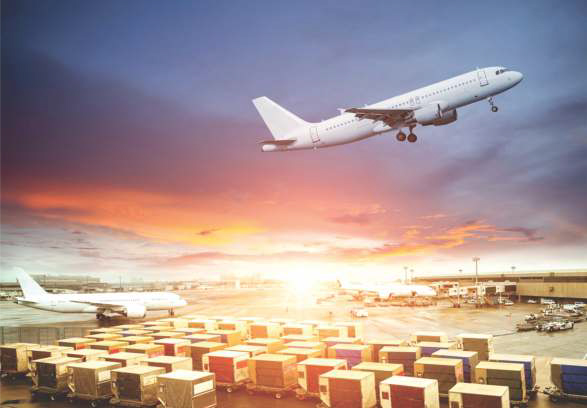India races against time to cope with high-speed dwell time in other global air cargo hubs
In Dubai, the loading and unloading of cargo can be processed within just 90 minutes. In Sharjah, the dwell time is 4 hours while in Singapore and Frankfurt, it takes 6 hours. But in India, the dwell time of exports takes 4 days and imports up to 4 weeks. Now, the Indian government wants to catch up with other global air cargo hubs aiming to have cargo clearance within a 24-hour basis.
By R. Chandrakanth
Airlines transport over 65.6 million cargo tons of goods a year, representing more than 35% of global trade by value but less than 1% of world trade by volume. That is equivalent to $6.8 trillion worth of goods annually, or $18.6 billion worth of goods every day, according to the International Air Transport Association (IATA).
The demand for air freight is driven by several factors, primarily time-sensitive and cost. Air freight is 12 to 16 times costlier than sea freight and typically priced 4 to 5 times that of surface transport, but fastest of all modes, requiring efficient supply chain. Time-sensitive commodities, including perishables, pharmaceuticals, etc., emergency shipments to meet deadlines; and other high-value products mostly take the air route.
From the shipper to the end-user, there are many stakeholders along the supply chain – air freight agent, warehouse/cold chain infrastructure, surface transport, ground handlers, regulatory authorities, airports, and airlines – who have to work in clockwork mode to ensure safe, secure and timely deliver of goods.
Dwell time reflects supply chain efficiency
A key player in this supply chain is the airport/air cargo terminal where dwell time reflects the efficiencies of ground handlers, cargo terminal layout, cargo inspection procedures, customs clearances, etc.
Dwell time is an indicator of how efficient the systems are in the supply chain. With technologies in place, skilled personnel at work, and standard operating procedures laid down, airports across the world are constantly updating to bring down dwell times.
Presently, Dubai Airports (Maktoum International Airport), the third busiest hub in the world for international freight with a capacity of 2.5 million tons, has a turnaround time of 90 minutes. All the cargo activity takes place at the Cargo Mega Terminal, totally streamlined. In Sharjah, the dwell time is 4 hours, in Singapore and Frankfurt it is 6 hours.
Compare this to dwell time at Indian airports (Mumbai, Delhi, Bengaluru, Hyderabad, Kolkata and Chennai) it is higher, going up to four days for exports and four weeks for imports, though in the recent past, things have improved at air cargo terminals for quick one-day turnaround.
Dinesh Krishnan, Managing Director of United Shipping Services and Chairman of Southern Region of the Air Cargo Agents Association of India (ACAAI), states that the issue of ‘dwell time’ is a problem of the past. “With the digitization of the Indian Customs interface, modern air cargo terminals for exports and imports, air cargo operations have improved and reduced the dwell time for at least 75% of the air cargo,” he said.
Explaining further he adds that same-day import arrival and delivery and same-day export gate to uplift have become a reality. The 25 % of cargo that is facing delays of over 24 hours can be attributed to deliberate non-compliance by the EXIM community to undermine the regulations, and delays by certain authorities.
“Some of these controls are deliberate delays as a non-tariff barrier to export or import some commodity and cannot be attributed to the logistics systems. Continuous digitization of these agencies and their inspection and certification, syncing it with ICEGATE shall further reduce the dwell for such special EXIM goods,” said Krishnan.
ICEGATE stands for Indian Customs and Central Excise Electronic Commerce/Electronic Data Interchange Gateway and is used by traders, cargo service providers, and other clients of the department.
“Going forward, both exporters and importers who are AEO (authorized economic operator) compliant and those who respect compliance can look forward to faster and smoother transit of their EXIM goods at Indian ports & airports,” said Krishnan.
AAI efforts to bring dwell time to international levels
While there have been continuous efforts to improve dwell time for cargo at airports, the Airports Authority of India (AAI) has stated that “special attention needs to be given to the speedy handling of cargo and reducing its dwell time. The objective will be to reduce the dwell time of exports from the present level of 4 days to 12 hours, and of imports from the present level of 4 weeks to 24 hours to bring us in line with internationally achieved norms. Cargo clearance will be on a 24-hour basis.”
AAI said that infrastructure relating to cargo handling like satellite freight cities with multi-modal transport, cargo terminals, cold storage, automatic storage and retrieval systems, mechanized transportation of cargo, computerization and automation, etc., is being set up on a top priority basis. The Electronic Data Interchange systems are being linked with stakeholders in the trade.
On the higher dwell time in Indian airports as compared to airports abroad, in the written feedback to the Civil Aviation Ministry, a cargo terminal operator at the Delhi International Airport pointed out: “It can be attributed to the fact that 100% cargo is customs processed through the airport terminal and not taken to consignee or forwarder’s location under bond for later time clearance. Delays occur due to delays in the submission of documents necessary for clearance, issues of misclassification of goods, etc. Further, the dwell time increases because of the working habits of everyone involved in the process. The actual working of clearance starts only after 1200 hours. In the case of exports, most of the dwell time can be attributed to airlines booking and accepting cargo much ahead of flight departure. Free period of 48 hours to airlines, allows them to hold cargo at the airport terminal much before the departure time of their flights.”
Post-COVID adoption levels
However, post-COVID-19, there have been accelerated efforts to improve the movement of cargo at Indian airports. The 2022 National Time Release Study (NTRS) reported a 16 % improvement in the average cargo release time in airport cargo complexes and it was 12 % for seaports or inland container depots.
With this improvement, the ICPs (Integrated Check Posts) have achieved the National Trade Facilitation Action Plan (NTFAP) target release time to be achieved by 2023, whereas the other three port categories have reached 75 % of NTFAP target.
NTRS 2022 and the Custom House level Time Release Studies, have found strong affirmation for the four-fold ‘path to promptness’ – a) advance filing of import documents enabling pre-arrival processing; b) risk-based facilitation of cargo; c) benefits of trusted client program – Authorized Economic Operators, and; d) Direct Port Delivery (DPD) facility.
In the case of exports, the study noted that the documentary clearance of export consignments, measured by the time taken from the arrival of the goods at the customs station to the grant of ‘Let Export Order’ has been significantly minimized, ranging from 4:04 hours in the case of ACCs (air cargo complexes) to 47:41 hours in the case of ICDs (inland container depots).
However, the studies have found that on account of various logistics processes, the time taken in the eventual export after the regulatory clearance takes a long time – accounting for 60 % of the total time in the case of ICPs to 92 % in the case of air cargo.
The freight agent should be well versed with the options available: next flight out, consolidation, and deferred services. There is no one-size-fits-all air cargo solution. An experienced agent easily determines which type is best for supply chain efficiency.
New technologies transforming supply chain performance
Supply chain management has seen dramatic changes, thanks to technologies/digitization such as blockchain, data analytics, and the Internet of Things which are facilitating customer fulfillment, resilient supply chain and also helping in achieving profitability.
Reports indicate that productivity in logistics will exponentially grow by over 40% by 2035 with artificial intelligence (AI) linked to multiple databases. AI can consolidate the data, identify gaps, and forecast things like asset requirements, terminal space availability, aircraft movement, bottlenecks, etc.
AI helps in monitoring cargo, optimizing routes, predicting maintenance, and automating logistics processes. The air cargo sector is fast moving away from legacy systems and becoming very agile, resilient, and highly competitive.














